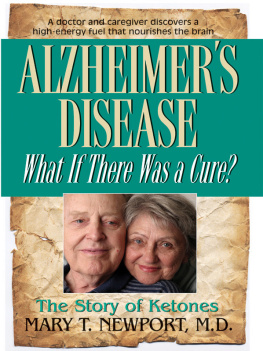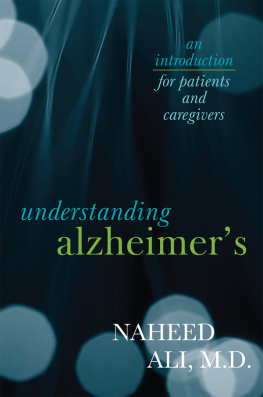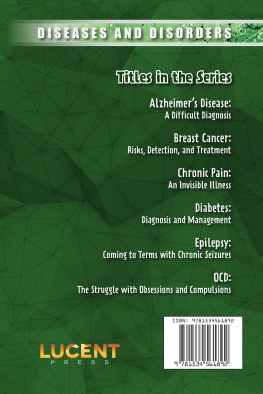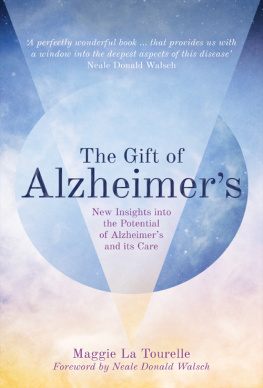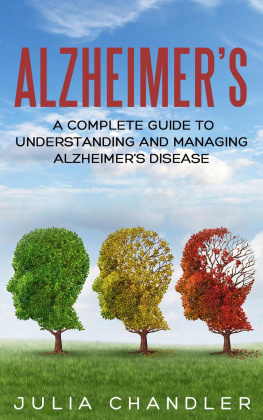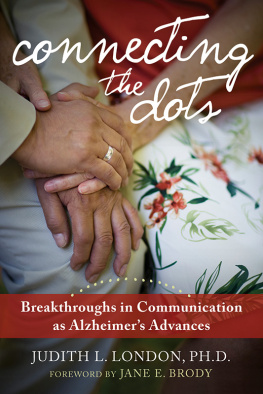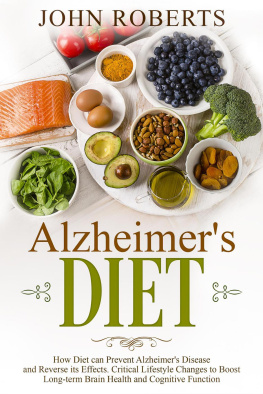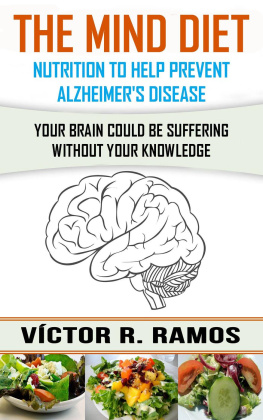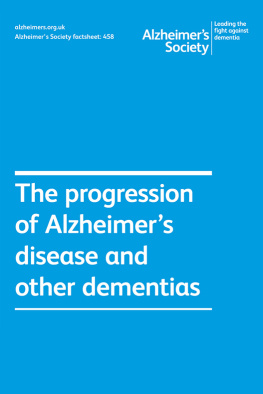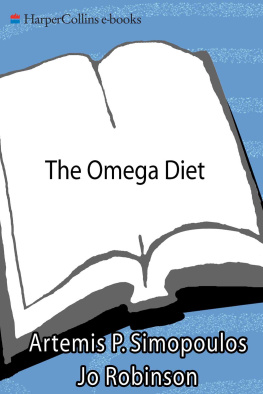Mary T. Newport - Alzheimers Disease: What if There Was a Cure?
Here you can read online Mary T. Newport - Alzheimers Disease: What if There Was a Cure? full text of the book (entire story) in english for free. Download pdf and epub, get meaning, cover and reviews about this ebook. year: 2013, publisher: Basic Health Publications, genre: Home and family. Description of the work, (preface) as well as reviews are available. Best literature library LitArk.com created for fans of good reading and offers a wide selection of genres:
Romance novel
Science fiction
Adventure
Detective
Science
History
Home and family
Prose
Art
Politics
Computer
Non-fiction
Religion
Business
Children
Humor
Choose a favorite category and find really read worthwhile books. Enjoy immersion in the world of imagination, feel the emotions of the characters or learn something new for yourself, make an fascinating discovery.
- Book:Alzheimers Disease: What if There Was a Cure?
- Author:
- Publisher:Basic Health Publications
- Genre:
- Year:2013
- Rating:5 / 5
- Favourites:Add to favourites
- Your mark:
- 100
- 1
- 2
- 3
- 4
- 5
Alzheimers Disease: What if There Was a Cure?: summary, description and annotation
We offer to read an annotation, description, summary or preface (depends on what the author of the book "Alzheimers Disease: What if There Was a Cure?" wrote himself). If you haven't found the necessary information about the book — write in the comments, we will try to find it.
Alzheimers Disease: What if There Was a Cure? — read online for free the complete book (whole text) full work
Below is the text of the book, divided by pages. System saving the place of the last page read, allows you to conveniently read the book "Alzheimers Disease: What if There Was a Cure?" online for free, without having to search again every time where you left off. Put a bookmark, and you can go to the page where you finished reading at any time.
Font size:
Interval:
Bookmark:
DISEASE
MARY T. NEWPORT, M.D.

The information contained in this book is based upon the research and personal and professional experiences of the author. It is not intended as a substitute for consulting with your physician or other healthcare provider. Any attempt to diagnose and treat an illness should be done under the direction of a healthcare professional.
The publisher does not advocate the use of any particular healthcare protocol but believes the information in this book should be available to the public. The publisher and author are not responsible for any adverse effects or consequences resulting from the use of the suggestions, preparations, or procedures discussed in this book. Should the reader have any questions concerning the appropriateness of any procedures or preparation mentioned, the author and the publisher strongly suggest consulting a professional healthcare advisor.
Basic Health Publications, Inc.
28812 Top of the World Drive
Laguna Beach, CA 92651
949-715-7327 www.basichealthpub.com
Library of Congress Cataloging-in-Publication Data
Newport, Mary T.
Alzheimers disease, what if there was a cure? : the story of ketones / Mary T. Newport.
p. cm.
Includes bibliographical references and index.
ISBN 978-1-59120-293-6
1. Alzheimers diseaseDiet therapy. 2. Fatty acidsTherapeutic use.
3. Coconut oilTherapeutic use. I. Title.
RC523.N535 2011
616.831061dc23
2011033778
Copyright 2011 Mary T. Newport, M.D.
All rights reserved. No part of this book may be reproduced, stored in a retrieval system, or transmitted by any means, electronic, mechanical, photocopying, recording, or otherwise, without written permission from the author.
Editor: Cheryl Hirsch
Typesetting/Book design: Gary A. Rosenberg
Cover design: Mike Stromberg
Printed in the United States of America
10 9 8 7 6 5 4 3 2 1
This book is dedicated to my husband, Steve, who says that taking care of our girls was the best job he ever had. He made it possible for me to fulfill my two dreams of becoming a doctor and having children, and he was always right there behind me with his love and support. Now it is my turn to take care of him.
This book is also dedicated to the millions of other caregivers who are fighting hard for their loved ones with Alzheimers and other tragic neurodegenerative diseases; may it offer a glimmer of hope. So many of you have shared your stories with me, real people who want nothing more than to keep their loved ones with them for as long as possiblea goal that I fully understand because we are on this journey together.
This book would not exist if not for the many years of dedication on the part of Richard L. Veech, M.D., D. Phil., to learning what ketone bodies can do and to applying this knowledge for the betterment of the millions of people who suffer from Alzheimers disease, Parkinsons disease, and a host of other neurodegenerative diseases. His work has personally affected my own family, giving us hope for the future, and for this I am extremely grateful. I also want to thank Dr. Veech for reviewing the chapters on ketones and providing me with many of the historical details. I would also like to express my gratitude to the other people who have worked side by side with Dr. Veech in this pursuit of knowledge to help others: M. Todd King, M.S.; Yoshihiro Kashiwaya, M.D., Ph.D.; Monica Skarulis, M.D.; Christian Bergman, B.S.; Shireesh Srivastiva, Ph.D.; Robert Pawlosky, Ph.D.; and Calvin Crutchfield.
I want to acknowledge the decades of work dedicated to researching and improving human nutrition by Theodore B. VanItallie, M.D., who worked out many details of the important metabolic principles discussed in this book. His article, Ketones: Metabolisms Ugly Duckling? provides a foundation for much of the discussion in Part Two of the book. I greatly appreciate his continued interest and involvement in ketone research and his keen review of the chapters on ketones and medium-chain triglycerides for this book.
I wish to acknowledge George F. Cahill, Jr., M.D., for his discovery that ketones can provide an alternative fuel for the brain, the fundamental principle underlying the dietary intervention discussed in this book. I also greatly appreciate his efforts in accompanying Dr. Veech and me to Capitol Hill to bring attention to the urgent need for funding for mass production of the ketone ester and clinical trials.
I want to acknowledge Beverly Teter, Ph.D., lipid biochemist from the University of Maryland, for her friendship as well as her extremely helpful, critical review of the sections on cholesterol and saturated fats.
I want to express my love and deepest appreciation to my sister, Angela Bertke, for her immense moral support and the innumerable hours she has spent helping me to get the message out, directly through her own efforts and by making herself available to take care of Steve so that I could get the message out. I want to recognize the endless hours she has spent reading my book, which have helped me stay on track with my goal of making the book readable for the nonscientist, and for her keen eye in proofreading the book. I also want to thank her husband, John Bertke, for going out of his way to spend time with Steve while I attended conference lectures.
I also want to express my love and gratitude to our daughter, Joanna Newport, not only for her day-to-day help with her father, but also for her assistance with some of the more tedious typing, for her expertise in creating diagrams for the book, and for the many hours she spent setting up our website www.coconutketones.com. I also want to recognize the love and support of our daughter, Julie DiPalo, and our many other family members.
I want to thank Lois Walsh for allowing me to share her poignant poetry that captures the very essence of caregiving for a loved one with Alzheimers disease.
I would also like to acknowledge the following: Eve Hosley-Moore, Steve Nohlgren, and their editors at the St. Petersburg Times for their efforts in writing and publishing their stories about Steve and ketones; the many people who have invited me to give interviews and lectures to further my cause of getting the message out to others; Tom Sokoloff for introducing me to Norman Goldfind, the publisher; and the editor of this book, Cheryl Hirsch, for her expertise in helping me bring our story and the story of ketones to the public.
Most importantly, I want to thank my husband, Steve, for his love, support, and patience and for being the kind of person whom you want to fight for.
Like millions of people in this country and around the world, my sixty-one-year-old husband, Steve, suffers from the nightmare that is Alzheimers disease. Alzheimers is the most common form of dementia in the United States. Many other people suffer from Parkinsons disease and less common forms of dementia and neurodegenerative conditions. These diseases take their toll not only on the victim but on their loved ones as well. No matter how young or old a person is at the onset of these diseases, the diagnosis is a devastating, life-altering blow. The future, once rosy and full of promise, takes on a different set of colors, bleak and gray.
How sad and cruel is the disease process known as dementia, that so many people finish out their lives without memories of what they have accomplished, unable to recognize the people they loved and who loved them, and finally unable to remember how to perform the simplest physical maneuver such as standing up and sitting down. How sad and cruel that people have to watch their beloved spouse or parent slowly slip away in this manner, and then worry that they will suffer the same fate.
Font size:
Interval:
Bookmark:
Similar books «Alzheimers Disease: What if There Was a Cure?»
Look at similar books to Alzheimers Disease: What if There Was a Cure?. We have selected literature similar in name and meaning in the hope of providing readers with more options to find new, interesting, not yet read works.
Discussion, reviews of the book Alzheimers Disease: What if There Was a Cure? and just readers' own opinions. Leave your comments, write what you think about the work, its meaning or the main characters. Specify what exactly you liked and what you didn't like, and why you think so.

